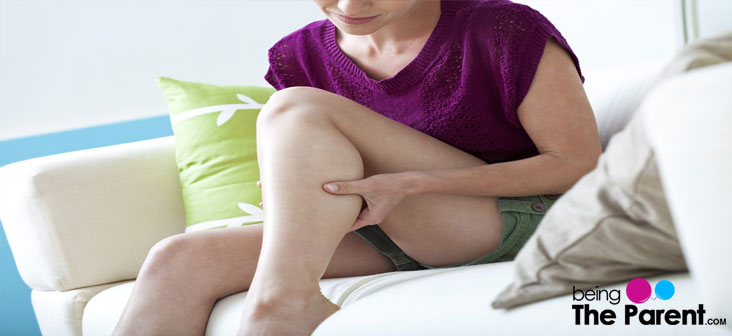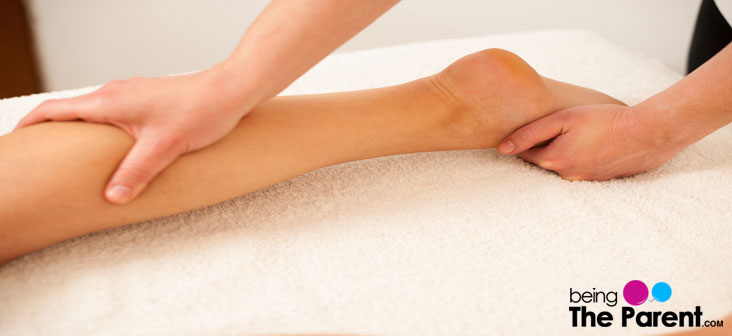
12 Simple And Effective Ways To Cure Postpartum Edema
5 min readWritten by Editorial Team

You have just delivered the most precious little baby and your happiness has no boundaries. This is also the time when you will be noticing a lot of unexpected things happening in your postpartum body like swelling in legs and feet, frequent urination etc. Before we get on to the remedies, read on to know the causes and symptoms of postpartum edema.

- What Is Postpartum Edema?
- What Are The Causes Of Postpartum Edema?
- Symptoms Of Postpartum Edema
- 12 Remedies That Help To Eliminate Postpartum Edema
What Is Postpartum Edema?
Swelling of feet, ankles, legs, hands etc. is very common during pregnancy and can pose a lot of discomfort to the pregnant woman. But did you know that this swelling can be present for a week or so even after your delivery?
During pregnancy, the blood volume increase by 50 % in order to protect and nourish the pregnant woman and her unborn baby. This leads to fluid accumulation due to low concentration of proteins in the body as well as dilution of blood. Post-delivery, not all of the extra blood leaves the body. So all the factors like the extra blood, changes in hormones and retention of fluid together can make your hands, legs and feet to swell up post-pregnancy. This is known as postpartum edema.
What Are The Causes Of Postpartum Edema?
- Hormones: One of the significant causes for postpartum edema is hormones. During pregnancy, the level of the hormone progesterone will be very high. Excess progesterone causes increase in sodium and water retention in the body that leads to postpartum edema
- IV fluids: IV liquids are another important reason for the postpartum swelling. It can happen in both C-section and vaginal birth. Most women who undergo a C-section get their medications and anesthesia through IV. Likewise, those who give birth vaginally get their medications such as Pitocin and certain fluids through IV. These fluids tend to accumulate in the body and thus cause localized edema which takes a few days to leave
- Delivery process: The natural pressure that develops during pregnancy causes puffiness. Along with it, the pushing during a vaginal delivery ends with bringing in more blood and fluids to the extremities. Therefore, it will lead to swelling in hands, legs and feet
- Increased size of the uterus: Another reason for postpartum swelling is the increased size of the uterus (after delivery, it will take some time for the uterus to get back to the normal size). As the uterus expands with the growing baby, pressure is applied over the veins that extend towards the lower part of the body. This can lead to fluid build-up and postpartum edema
Symptoms Of Postpartum Edema
- Moderate to extreme swelling in the hands and legs
- The parts which are swollen appear inflamed, shiny n puffy
- When you press the skin, it sinks in
- There may be swelling in the abdomen along with swelling in hands and legs
12 Remedies That Help To Eliminate Postpartum Edema
Here are some remedies which will help in eliminating postpartum edema. But here is a word of caution. Before trying out any of these remedies, consult your doctor to make sure that the swelling is due to postpartum edema only and not because of any underlying issue. Once your doctor ensures that swelling in your feet and body is not so serious then you can actually try out the following ways to get relief from postpartum edema:
1. Elevate the swollen parts:
Elevating the swollen hands and legs above the level of your heart for some time will help to reduce the swelling and the discomfort caused due to edema. You can use a stool or pillows to elevate the area that is affected by edema. Keep the hands and legs in elevated posture for 30 minutes three or four times a day
2. Get moving:
If you happen to sit or stand still for a really long time, edema has a tendency to aggravate, because the fluids remain stagnant in your body’s tissues. Therefore, do not sit or stand for a long time
3. Massage:
Massaging the swollen leg and feet will help reduce the swelling and eliminate postpartum edema. It flushes out excess fluid buildup and is great for circulation

4. Take in more fluid:
Yes, you read it right. Fluid retention decreases with increasing the intake of fluid. This is because the intake of more fluids helps in flushing out excess fluid from the body, thereby reducing the swelling. Make sure you drink lots of water and flush it out more often
5. Healthy diet:
A diet rich in fruits, vegetables and other healthy foods can help reduce swelling. Eating foods rich in B-vitamins and iron can ease edema. Therefore, eat green leafy veggies and whole grains. Also, include foods that act as natural diuretics like pumpkin, asparagus and beets in your daily diet. This will help to flush out excess fluids
6. Cabbage:
Placing cabbage leaves in the swollen area helps to drain out the extra fluid from that area and provide relief. For this, simply wipe the leaves clean without any water and first cool them in the refrigerator. Now, keep these chilled leaves on the swollen area, to make a cold compress. Keep the leaves until they get wet. Replace the wet leaves with fresh, chilled leaves till the pain becomes less. You can do this as often as required until you get relief
7. Avoid processed food/ salty food:
Eating a lot of salt causes your body to hold water, aggravating edema. So avoid salty foods like prepackaged snacks, fried food and fast food. With the help of your doctor find out your daily intake of sodium and avoid eating food that are rich in sodium
8. Ensure proper ventilation:
Ensure the room you spend most time in has proper ventilation. Ensuring proper air flow will prevent the edema from aggravating. Likewise, do not wear tight outfits
9. Exercise:
Doing some light exercises increases circulation, helping the swelling to subside.
- Going for a short walk, several times a day will help with blood circulation. A 15 to 30 minutes fast strolling can also help the swelling go down
- Foot exercises will help you to bring down swelling in the ankles. For this;
- Bend and stretch the foot up and down 30 times
- Move each foot in circular motion eight times clockwise and eight times anti-clockwise
10. Soaking the feet:
If your feet are excessively swollen, massaging increases the pain and discomfort. Then soak the feet in a bowl of warm water. You can add a combination of aromatherapy oils. You can mix cypress oil with lavender oil, which helps with better blood circulation and reduce discomfort
11. Herbal Remedies for Edema During Pregnancy:
It has been proved that herbs or herbal extracts containing flavonoids can help reduce the swelling. However, as you are a nursing mother, consult your doctor before going for herbal remedies. You can also add any of the diuretic herbs like parsley, horsetail, watercress, etc., to boiling water and prepare tea. But remember, moderation is the key here
12. Take plenty of rest:
Take plenty of rest. Never do things that require physical exertion. Try to get good sleep whenever the baby takes a nap. While taking rest remember, never sit or cross your legs as it will block or slow down the blood flow. If edema is severe, the pain and swelling will increase if you walk more
If your edema does not subside even after lifestyle changes mentioned above, consult your doctor. He can prescribe a diuretic which will help to flush the fluid from your body.

Editorial Team,
With a rich experience in pregnancy and parenting, our team of experts create insightful, well-curated, and easy-to-read content for our to-be-parents and parents at all stages of parenting.Read more.
Responses (0)
Want curated content sharply tailored for your exact stage of parenting?
Related articles

Passion Fruit (Krishna Phal) For Babies – Is it Safe, When to Introduce and Benefits

Top 9 Best Black and White Books For Newborn Babies

Old Mac Donald Rhyme For Babies

Top Activities For a 2 Month Old Baby – Benefits and Tips For Parents

Rattles For Babies – How it Helps in Baby’s Development

Wheels on the Bus Rhyme For Babies
Sponsored content
Discover great local businesses around you for your kids.
Get regular updates, great recommendations and other right stuff at the right time.





